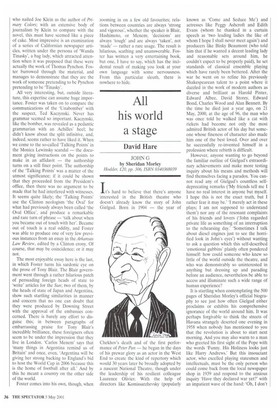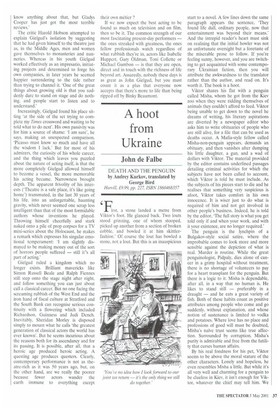All his world a stage
David Hare
JOHN G by Sheridan Morley
Hodder, £20, pp. 306, ISBN 0340368039
It's hard to believe that there's anyone interested in the British theatre who doesn't already know the story of John Gielgud. Born in 1904 — the year of
known as 'Come and Seduce Me') and actresses like Peggy Ashcroft and Edith Evans (whom he thanked in a curtain speech as 'two leading ladies the like of whom I hope 1 shall never meet again') and producers like Binky Beaumont (who told him that if he wanted a decent leading lady and reasonable sets around him, he couldn't expect to be properly paid), he set standards of classical ensemble playing which have rarely been bettered. After the war he went on to refine his previously Shakespearean talent to a point where it dazzled in the work of modern authors as diverse and brilliant as Harold Pinter, Edward Albee, David Storey, Edward Bond, Charles Wood and Alan Bennett. By the time he died just a year ago, on 21 May, 2000, at the age of 96, the man who was once told he walked like a cat with rickets had become not only the most admired British actor of his day but someone whose fineness of character also made him one of the best loved. Over and over he successfully re-invented himself in a profession where rebirth is difficult.
However, anyone wanting to go beyond the familiar outline of Gielgud's extraordinary achievements and make more testing inquiry about his means and methods will find themselves facing a paradox. You cannot read any of Gielgud's countless selfdeprecating remarks (`My friends tell me I have no real interest in anyone but myself. I hope this is not the exact truth, but I rather fear it may be.' I merely act in these plays; I am not supposed to understand them') nor any of the resonant complaints of his friends and lovers (`John regarded private life as something of an interruption to the rehearsing day.' Sometimes I talk about diesel engines just to see the horrified look in John's eyes') without wanting to ask a question which this self-described 'emotional gubbins' plainly often pondered himself: how could someone who knew so little of the world outside the theatre, and who was demonstrably so uninterested in anything but dressing up and parading before an audience, nevertheless be able to access and illuminate such a wide range of human experience?
It is startling when contemplating the 500 pages of Sheridan Morley's official biography to see just how often Gielgud either proclaims or exhibits his comprehensive ignorance of the world around him. It was perhaps forgivable to think the streets of Havana strangely deserted one evening in 1958 when nobody has mentioned to you that the revolution is about to start next morning. And you may also warm to a man who greeted his first sight of the Pope with the words 'Funny. His Holiness looks just like Harry Andrews.' But this insouciant actor, who excelled playing statesmen and intellectuals, must be the only person who could come back from the local newspaper shop in 1939 and respond to the anxious inquiry 'Have they declared war yet?' with an impatient wave of the hand: 'Oh, I don't
know anything about that, but Gladys Cooper has just got the most terrible reviews.'
The critic Harold Hobson attempted to explain Gielgud's isolation by suggesting that he had given himself to the theatre just as, in the Middle Ages, men and women gave themselves to monasteries and nunneries. Whereas in his youth Gielgud worked effectively as an impresario, initiating projects and determined to forge his own companies, in later years he seemed happier surrendering to the tide rather than trying to channel it. 'One of the great things about growing old is that you suddenly dare to stand on stage and do nothing, and people start to listen and to understand.'
Increasingly, Gielgud found his place sitting 'at the side of the set trying to complete my Times crossword and waiting to be told what to do next'. His own passivity was for him a source of shame: 'I am sure', he says, making an unexpected comparison. 'Picasso must know so much and have all the wisdom I lack.' But for most of his admirers, the curiosity of his whole career, and the thing which leaves you puzzled about the nature of acting itself, is that the more completely Gielgud allowed himself to become a vessel, the more memorable his acting became. Narrowness brought depth. The apparent frivolity of his interests (Theatre is a safe place, it's like going home') transmuted, in the last 30 years of his life, into an unforgettable, haunting gravity, which never seemed one scrap less intelligent than that of the most formidable authors whose inventions he played. Throwing himself cheerfully and stark naked onto a pile of prop corpses for a TV mini-series about the Holocaust, he makes a remark which expresses his singular emotional temperament: 'I am slightly dismayed to be making money out of the sort of honors people suffered — still it's all part of acting.'
Gielgud ruled a kingdom which no longer exists. Brilliant mavericks like Simon Russell Beale and Ralph Fiennes still step onto the stage night after night, and follow something you can just about call a classical career. But no one facing the screaming rubbish of the West End and the iron hand of fiscal culture at Stratford and the South Bank can recognise serious continuity with a flowering which included Richardson, Guinness and Judi Dench. Inevitably, Sheridan Morley is disposed simply to mourn what he calls 'the greatest generation of classical actors the world has ever known'. But he seems incurious about the reasons both for its ascendancy and for its passing. It is possible, after all, that a heroic age produced heroic acting. A questing age produces questers. Clearly, contemporary performance is not as theatre-rich as it was 50 years ago, but, on the other hand, are we really the poorer because fewer actors wander the earth immune to everything except their own métier ?
If we now expect the best acting to be found as much on television and on film, then so be it. The common strength of our most fascinating present-day performers — the ones streaked with greatness, the ones fellow professionals watch regardless of what rubbish they're in, actors like Isabelle Huppert, Gary Oldman, Toni Collette or Michael Gambon — is that they are open, direct and in touch with the richness of life beyond art. Assuredly, nobody these days is as great as John Gielgud, but you must count it as a plus that everyone now accepts that there's more to life than being ripped off by Binky Beaumont.











































































 Previous page
Previous page